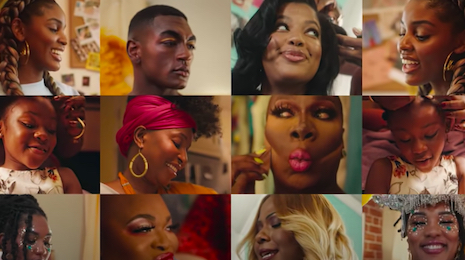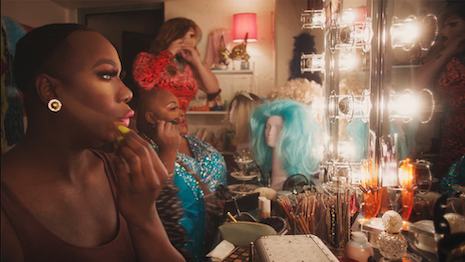 Sephora reminds beauty lovers that Black culture is highly influential in the industry. Image credit: Sephora
Sephora reminds beauty lovers that Black culture is highly influential in the industry. Image credit: Sephora
LVMH-owned beauty retailer Sephora is celebrating the indispensable contributions of Black creators and contributors in the beauty industry in a new short film, “Black Beauty Is Beauty.”
The vignette highlights the universal influence of the Black community, which has not received due attention nor credit, despite shaping the beauty industry. “Black Beauty Is Beauty” showcases the tireless work and trends that have permeated throughout the industry, as Sephora works toward providing a prominent space for Black brands.
“Representation matters and giving credit to those that are due that is also essential,” said Kimmie Smith, cofounder and creative director of Athleisure Mag, New York.
“Giving a quick history on the impact of tools, products and methods that have been credited by Black people and how everyone gets to enjoy the efforts and creations of the culture is a great way to drive awareness and to also understand why it’s important to have diversity in companies,” she said.
Black Beauty Is Beauty
The spot establishes a sense of camaraderie, opening with a group of women happily conversing and applying makeup and haircare at a salon. The opening shot includes a framed poster that reads “Black Beauty Is Beauty” on the wall of the salon.
The film then transitions into several scenes with photos of classic hairstyling tools, black-and-white photos of early salons, people applying makeup for both everyday looks as well as show appearances and more.
Sephora celebrates and commends the work of Black creators in shaping the beauty industry
“There’d be no cut creases, or beat faces, without these legendary icons,” the female narrator explains. “No baby hairs or laid edges, without tight coils and a mother’s love.”
Scenes and photos of looks from the past as well as a wide range of people of different sizes, ethnicities and backgrounds engage in makeup and beauty techniques implemented by the Black community.
The message of the video resonates: whether through a salon, personal experimentation or engaging in beauty routines with family members, Black creators have served as a driving force in making the beauty industry what it is today.
"Sephora’s short film is honoring and giving credit to the contributions black hairstyles and makeup have made to our society at large,"said Rebecca Miller, founder/CEO of ARTful Communication, New York. "It chronicles various applications of personal care and beauty products using a variety of individuals from various ethnicities to showcase how one trend led to another and remains in our world of beauty today.
"The film demonstrates respect for black beauty as it reveals the joy it has and continues to provide to all."
Directed by Academy Award nominee Garrett Bradley, the campaign illustrates how the Black community has crafted looks that influence and shape the beauty industry, regardless of consumers’ ethnicity, gender or any physical attribute.
“It’s time we all gave Black beauty the credit it deserves,” the voiceover says. “Join Sephora in supporting and celebrating Black beauty.”
 The film showcases different aspects of Black culture. Image credit: Sephora
The film showcases different aspects of Black culture. Image credit: Sephora
As Sephora reminds shoppers, the Black beauty industry is the beauty industry.
“I think it’s effective and even encourages those who watch to see more of our impact in this industry and to also draw awareness between the balance of supporting major and independent brands,” Ms. Smith said. “You never know if that technique or invention may be the next big thing that everyone is using whether in that brand or adopted by others.”
Promoting Black voices, beauty
As a leading beauty retailer, and in response to the Black Lives Matter movement, Sephora has implemented new strategies to amplify Black voices.
The retailer has committed to dedicating at least 15 percent of its shelf space to Black-owned brands through its 15 percent pledge. Only 3 percent of brand at major beauty retailers are Black-owned, according to a 2020 report from Fast Company.
In June 2020, Sephora carried eight Black-owned brands, however, by the end of 2021, it will more than double its assortment overall, including achieving the 15 percent benchmark in prestige haircare. As of July 2021, Sephora’s offerings include 16 Black-owned brands, and several new brands are expected to launch this fall (see story).
Earlier this year, Sephora selected eight brands that would participate in the retailer’s 2021 Accelerate incubator program, comprised exclusively of BIPOC-founded brands.
Marking its sixth year, the Sephora Accelerate program focuses on cultivating an international community of female beauty founders and providing curriculum, mentorship, merchandising support, funding and investor connections to its participants. In maintaining its commitment to expanding representation within the beauty sector, Sephora selected only BIPOC-owned brands to participate in this year’s program (see story).
At the start of 2021, Sephora revealed its plan to mitigate racially-biased experiences and unfair treatment of shoppers in the retail sector across all of its U.S. stores.
Racism, discrimination and other forms of racially-motivated unfair treatment are pervasive issues in the United States. Through its Racial Bias in Retail study, Sephora explores the disparate experiences in retail in regards to race and aims to identify actionable solutions to ignite meaningful, long-term change (see story).
Sephora is one of many high-end brands and retailers amplifying Black creators and helping ensure a more inclusive beauty industry for all. With efforts like this vignette from Sephora, brands can help the Black community maintain an integral part of the industry and gain footing in leadership positions, leading to a more diverse, stronger and more inclusive sphere in general.
“It’s important to keep these ideas at the forefront in the forms of video, creating in-store videos or creative on their website next to product,” Ms. Smith said. “Hopefully, this will encourage beauty brands individually to also support this endeavor by learning about the history of elements from their company that are derived from Black beauty.
“Ensuring that they are diverse in their hiring practices across a number of positions so that they encourage Black voices can continue to extend these conversations and encourage others to also seek these positions as well.”